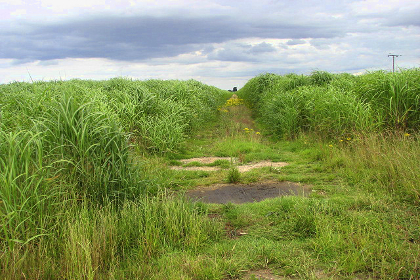
Biofuels, Plastics and Drugs: Is This the Future of Our Farms?
Farmer Rob Pickering last week planted nine hectares of flood-prone land in Lincolnshire with an African plant called miscanthus, or elephant grass. By selling the fast-growing crop as biofuel for Drax power station, he should earn as much as he would from selling wheat on the world market.
Pickering is part of a rural revolution that, thanks to climate change, low commodity prices and new consumer tastes, is seeing Britain’s fields planted with crops that are more likely to end up as electricity or paint additives than food.
April 16, 2016 | Source: The Guardian | by John Vidal
Farmer Rob Pickering last week planted nine hectares of flood-prone land in Lincolnshire with an African plant called miscanthus, or elephant grass. By selling the fast-growing crop as biofuel for Drax power station, he should earn as much as he would from selling wheat on the world market.
Pickering is part of a rural revolution that, thanks to climate change, low commodity prices and new consumer tastes, is seeing Britain’s fields planted with crops that are more likely to end up as electricity or paint additives than food.
In Essex, David Eagle is growing acres of sea buckthorn, a salt-tolerant plant that grows wild in Siberiacorrect and northern Europe. Its orange berries can be used in food and drink products, but are bought mainly by cosmetics and pharmaceutical industries. Eagle knows his coastal defences may not withstand many more storms and increases in sea-levels, so wanted a future-proof crop. “Our sea walls are in good condition but the future may not be so certain in an era of climate change,” he says.
The stories you need to read, in one handy email
Read more
In East Anglia, borage, hemp and flax are being grown for their oils, daffodils for drugs use, and lavender for cosmetics. The hop fields of Kent are expanding as the global boom in micro-breweries sees British hop exports to the US soaring, and wildflower seed farms are springing up on former grazing land in Lincolnshire as farmers take environmental action in return for EU subsidies.
Dorset farmers are paid premium prices by drugs firms to grow poppies and cannabis for medicines, but the market for pharmaceuticals is small, tightly controlled and limited, says David Turley of the National Non-Food Crop Centre (NNFCC) in York.
“Non-food crops have seen boom and bust years as farmers try planting new crops in bad times, only for the price to drop when supply outstrips demand,” he says. “Three years ago, everyone was growing evening primrose. Then the Chinese got in and that ended.”
Warmer winters have allowed exotic fruits and vegetables to be grown commercially in Britain, says the National Union of Farmers, but industrialists expect the next boom to be in plants whose sugars can be used to make plastics and packaging .
“There is great interest in the bio-economy,” said Turley. “We are now taking ethanol [from wheat] to make plastics. It’s an emerging market that I think will become huge as large brands become concerned about sustainability. I would expect many more plants to be grown for plastics.”
